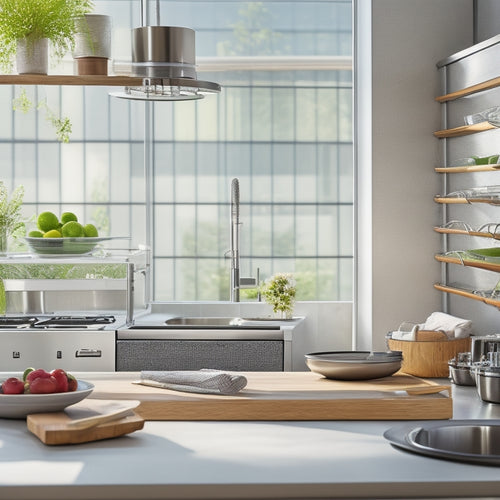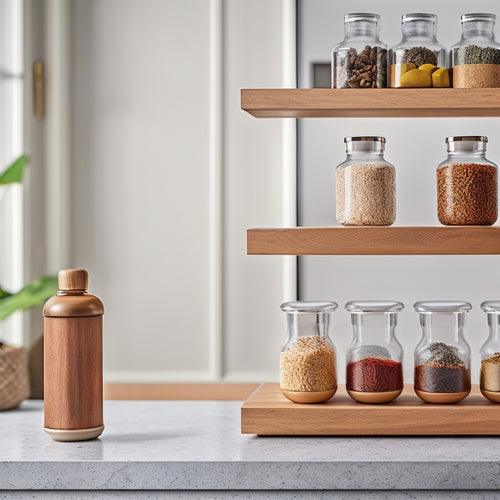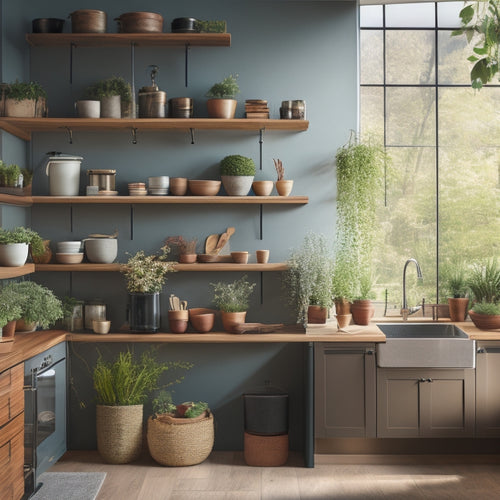
Revamp Your Produce Storage: Follow These Tips
Share
Proper produce storage is essential for maintaining flavor, texture, and nutritional value. Different fruits and vegetables have unique storage requirements, and using the right containers can make a significant difference. room temperature and refrigeration have distinct benefits, with tomatoes and apples thriving at room temperature and leafy greens and berries preferring refrigeration. To maximize shelf life and quality, keep produce away from direct sunlight, heat sources, and strong-smelling foods, and use breathable bags to reduce moisture buildup. By understanding these basics, you can create a tailored storage system that meets each produce's unique needs and reveal the full potential of your fresh fruits and vegetables.
Key Takeaways
• Different fruits and vegetables have unique storage requirements, so categorize and store them accordingly to maintain freshness and quality.
• Use breathable containers for berries and airtight containers for citrus fruits to prevent moisture buildup and maintain flavor.
• Store tomatoes and apples at room temperature, while leafy greens and berries require refrigeration to stay fresh.
• Keep produce away from direct sunlight, heat sources, and strong-smelling foods, and regularly clean and dry storage containers to prevent contamination.
• Develop a tailored storage system that prioritizes freshness preservation, and learn specific storage tips for commonly consumed produce to reduce waste and maximize shelf life.
Understand Proper Storage Basics
Proper produce storage begins with a fundamental understanding of the unique needs of each type of fruit and vegetable. Improper storage can greatly impact the flavor, texture, and color of your fresh goods. Different fruits and vegetables have varying storage requirements, and using the right storage containers can make a significant difference.
For instance, berries require breathable containers to prevent moisture buildup, while citrus fruits can be stored in airtight containers to maintain their freshness. Understanding the ripening stages of your produce is also pivotal. Some fruits, like bananas, continue to ripen after they're picked, while others, like apples, can be stored for months.
Room Temperature Vs Refrigeration
When it comes to storing produce, one of the most important decisions is whether to keep it at room temperature or refrigerate it, as different fruits and vegetables respond uniquely to these environments. Proper storage is vital for food safety and sustainability efforts.
| Produce | Storage |
|---|---|
| Tomatoes, Apples | Room Temperature |
| Leafy Greens, Berries | Refrigeration |
| Citrus Fruits, Carrots | Either (depending on ripeness) |
Maximizing Shelf Life and Quality
Its shelf life and quality are greatly influenced by the storage conditions of produce, making it vital to understand how to maximize them.
Proper storage is essential to maintaining freshness, flavor, and texture. To extend shelf life, use storage hacks such as storing produce in breathable bags or containers to reduce moisture buildup.
Freshness tips include keeping produce away from direct sunlight, heat sources, and strong-smelling foods. Regularly cleaning and drying storage containers also help prevent contamination.
Create a Storage System That Works
Develop a tailored storage system by categorizing produce into groups based on their specific storage requirements, ensuring that each item is stored in a way that optimizes its freshness and quality.
Implement organizational hacks, such as assigning specific shelves or bins for each group, to maintain a clutter-free and accessible storage area.
This approach enables you to prioritize freshness preservation by storing produce in a way that meets its unique needs. For instance, store delicate herbs in a cool, dry place, while keeping root vegetables in a dark, cool location.
Tips for Commonly Consumed Produce
By implementing a tailored storage system, you can now focus on learning specific storage tips for commonly consumed produce, such as apples, bananas, and carrots, to further extend their shelf life.
For best freshness preservation, store apples in a cool, dry place, while bananas should be kept at room temperature, away from direct sunlight. Carrots, on the other hand, prefer a cool, dark place with high humidity.
When purchasing seasonal varieties, choose those with minimal packaging to reduce waste. Choose sustainable packaging options like reusable bags or containers to minimize your environmental impact.
Frequently Asked Questions
Can I Store Bananas Near Apples to Ripen Them Faster?
'In days of yore, fruit ripening was an art; today, it is understood that bananas and apples have different ethylene production rates, making it unwise to store them together, as it may hasten spoilage rather than ripening in produce storage.'
How Do I Keep Onions From Sprouting in My Pantry?
To prevent onions from sprouting, store them in a cool, dry place with good air circulation, away from direct sunlight and moisture. This helps prevent mold growth and promotes longer storage life, similar to storing potatoes.
Are Mesh Bags or Paper Bags Better for Storing Oranges?
Did you know that 40% of fresh produce goes to waste due to improper storage? When storing oranges, opt for breathable mesh bags over paper bags to maintain humidity and prevent mold growth, and consider cloth or cotton bags over plastic or burlap for their natural, non-reactive properties.
Can I Store Cucumbers at Room Temperature or Must They Be Refrigerated?
When it comes to storing cucumbers, prioritizing correct vegetable storage for the best food preservation is crucial. To maintain freshness and safety, cucumbers should be refrigerated at a temperature below 40°F (4°C) to prevent moisture accumulation and bacterial growth.
Do Lemons Last Longer at Room Temperature or in the Fridge?
In the citrus kingdom, lemons reign supreme, but their longevity depends on the throne they occupy. At room temperature, lemons ripen quickly, while refrigeration slows the process, ensuring a longer shelf life, especially when stored away from other fruits that accelerate ripening.
Related Posts
-

Top-Rated Dish Drainers for Kitchen Use
Top-rated dish drainers enhance your kitchen's efficiency and aesthetics. You'll find compact designs that save preci...
-

Modern Countertop Spice Organizer Designs
Modern countertop spice organizer designs enhance your kitchen's aesthetics while maximizing functionality. These spa...
-

Easy-To-Install Kitchen Wall-Mounted Racks
Installing easy-to-use kitchen wall-mounted racks is a smart way to maximize your space. These racks help keep your c...


